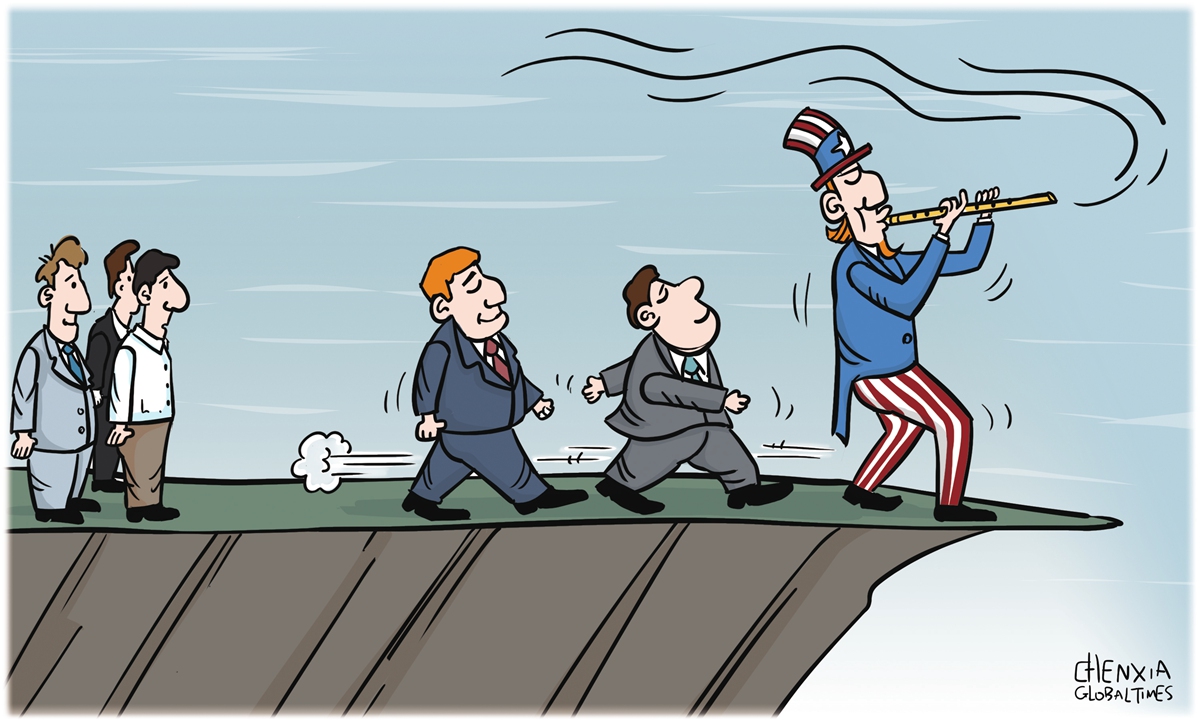
Illustration: Chen Xia/GT
The US hosted South Korean and Japanese national security officials to discuss "security issues." It was the first time since South Korean President Yoon Suk-yeol took office, but the meeting unexpectedly "deviated" from its original goal. Regarding the meeting held in Hawaii on Thursday, the US had wanted to shift the topic to "how to cope with the growing security challenges from China," but as shown in the media reports after the meeting, the recent economic friction between the US and South Korea took a prominent place during the meeting, opening a crack in the "solidarity" that the US deliberately showed with its allies in East Asia.
The US passed the Inflation Reduction Act (IRA) in the middle of last month. One of the important aspects is to provide high subsidies for electric vehicles (EV) made in the US, while there is no subsidy for vehicles made in South Korea. This will put South Korean companies in an extremely disadvantageous position. South Korean media outlets described such US practice of violating the principles of free and fair trade as a "slide tackle." Hyundai Motor currently ranks No.2 in the US' EV market, but everyone can see that if the US resorts to rules-breaking "slide tackle" tactics without being punished, it will be impossible for South Korean cars to maintain their position in the US market. South Korea generally believes that the IRA is a "betrayal" of South Korea and "a stab in the back." South Korea has become so engulfed in disappointment and anger that the illusion of "free and fair trade" that underpins the US-led world order has been shattered again.
However, in the face of strong concerns from allies, the US has put on an act. According to US media reports, the US was "surprised" by the questions raised by South Korea and expressed regret. This "surprise" should be the genuine reaction of the US, indicating that the US had not taken South Korea's interests into consideration from the very beginning. After repeated negotiations with the South Korean side, the US side only indifferently expressed the meaning of "let's go back to discussions," but it did not actually respond to Seoul's concerns. Such arrogance and indifference are undoubtedly an insult to South Korea's self-esteem.
This is not the first time that South Korean public opinion complains about US "betrayal" and "stab in the back." In 2018, the revision of the Korea-US Free Trade Agreement was completed, and South Korea promised to further open up the domestic auto market. However, the US extended the 25-percent import tariff on South Korean passenger and cargo minivans until 2041. The two major Korean car companies, Hyundai and Kia, said at that time that it was insulting. It is the same with the US' recent coercive actions against South Korea's chip industry which don't show any concern about whether they will harm South Korea's interests. In the face of its interests, the US pursues not only the "first," but also the "only" in many cases.
South Korea's strong reaction this time is, to a certain extent, an "awakening." It has also taught other countries a lesson and allowed people to have a more comprehensive understanding of the US and the so-called alliance of values. Since Yoon took office, Seoul has actively carried out diplomatic engagement with Washington, hoping to make it a highlight of his administration. But it has instead become a big trap.
It should be said that the aggressive behavior of the US has stimulated the awakening of South Korea, especially among conservatives. In the past, they thought too highly of the US. The Korea Joong Ang Daily commentary asked, "Does that mean the allies can share values but not interests?" It also lamented, "Values give way to national interests."
This may be the "new understanding" among some in South Korean public opinion sphere, but it is actually just the way the US is. No matter what beautiful words it uses, the so-called values are just rhetoric used by the US to fool its allies to maintain hegemony. For the US, "shared values" has always meant the unconditional obedience of allies to the interests of the US, rather than bargaining chips that allies can use to deal with the US. Washington has firmly put the right to interpret "values" in its own hands. Only those who follow it have "shared values" with it, while those who go against the US don't.
As the South Korean media concluded, behind Washington's smiles is the "America First" policy that has become "more cunning and more vicious." History has also repeatedly shown that the US has a quite strong desire for preserving its interests. From a certain sense, the rhetoric of values is designed specially to serve Washington's interests.
Former US secretary of state Henry Kissinger once said that "it may be dangerous to be America's enemy, but to be America's friend is fatal." The dispute has just proved it. South Korea is not the first country that has raised doubts about Washington's hypocritical face and true purpose of its so-called Into-Pacific Strategy, nor will it be the last one. The US wants to use other countries as "cannon fodder" in maintaining hegemony, but it can't realize this ambition. A chain of interests in which various countries will oppose US bullying will become clearer.

